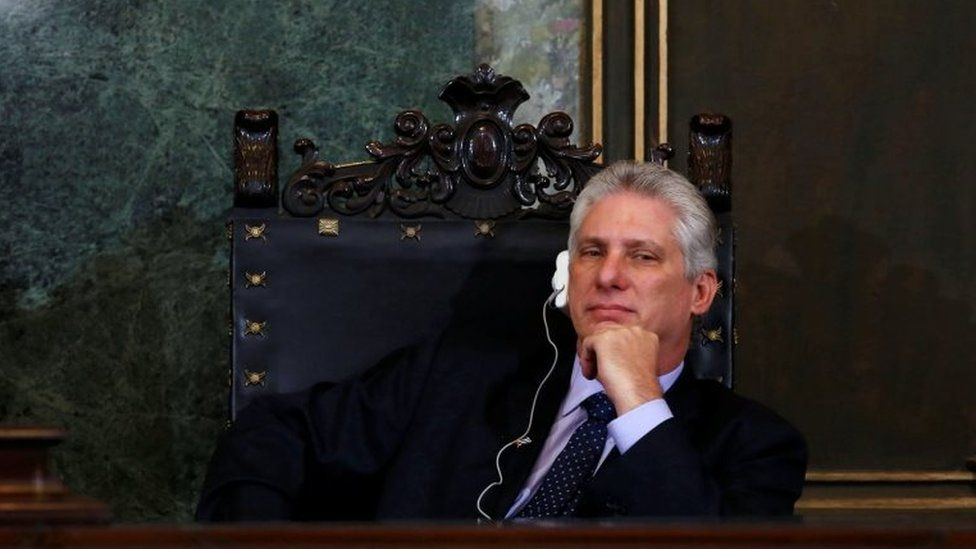Miguel Díaz-Canel: The man succeeding the Castros
- Published

Miguel Díaz-Canel is the first person to hold both the Cuban presidency and the leadership of the nation's Communist Party (PCC) without bearing the Castro surname. And in July 2021, after more than three years at the helm, he faced the most significant opposition demonstrations in decades on the island.
"We're ready for anything and we'll be in the streets fighting," Mr Díaz-Canel said in a defiant speech on TV on 12 July, after thousands of people joined street protests. They were voicing their frustration over widespread shortages of food and medicines, and surging Covid-19 cases.
The spread on social media of videos documenting the protests and the repression also put the government on the defensive, more than ever, as it tried to control the political narrative.
Mr Díaz-Canel, who was handpicked by former leader Raúl Castro as his successor, blamed US-led efforts to force regime change and called for an end of the long-running US embargo on Cuba.
"There are many of us revolutionaries in this town who are willing to give our lives," he said. "And this is not a slogan, it is conviction. They [protesters] have to go over our dead bodies if they want to confront the revolution."
But the outburst of anger in so many different locations, with many chanting "Freedom!" and "Down with Communism!", raised questions about how long the authorities could maintain their grip on the streets.
Steady rise
Mr Díaz-Canel was born in April 1960, little over a year after Fidel Castro was first sworn in as prime minister.
He studied electrical engineering and began his political career in his early 20s as a member of the Young Communist League in Santa Clara, a city which was the site of the last battle in the Cuban Revolution and which to this day is dominated by the Che Guevara Mausoleum.
While teaching engineering at the local university, he worked his way up the ranks of the Young Communist League, becoming its second secretary at the age of 33.
He also played a key role in the Communist Party in his native province of Villa Clara. During his time at the helm of the provincial government, it was said to have enjoyed more freedoms than other parts of the country.
Rock concerts that would have been banned elsewhere went ahead, locals say, and since 1985 the city has been the home of one of Cuba's most famous LGBT cultural centres, El Mejunje.
Its owner said the club would not have survived had it not been for Mr Díaz-Canel's backing. The club welcomed "anyone different" at a time when communist Cuba did not.
'No upstart'
Despite his steady work at provincial level, it took Mr Díaz-Canel another 10 years, until 2003, to make it onto the Politburo, the Communist Party's executive committee.
In 2009, he was elevated to the post of minister of higher education and in 2013 he finally made it to vice-president. His steady rise and "ideological firmness" were praised by the man who has been his main backer, Raúl Castro.
At the time that he made him his number two, Mr Castro insisted that Mr Díaz-Canel was "no upstart", a compliment in a party which has been dominated by those who fought alongside Fidel Castro in the revolution in the 1950s.
In 2018, Mr Díaz-Canel was overwhelmingly elected as Cuban president by the National Assembly. Three years later, he was appointed as the first secretary of the PCC, again replacing Raúl Castro.
For now, there is no reason to believe Mr Díaz-Canel's position is under threat, with a large number of demonstrators, probably several hundred, still behind bars.
But the protests did expose the frustration of large parts of Cuban society. It remains to be seen whether the president is willing, or able, to bring about change.
Additional reporting by BBC Monitoring
Related Topics
- Published14 July 2021
- Published13 July 2021